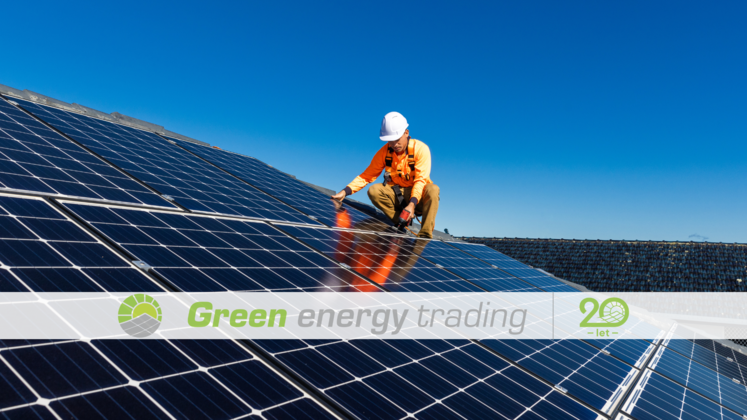A comprehensive overview of answers to the most frequently asked questions about photovoltaics
 18. 9. 2025
18. 9. 2025
Are you considering switching to solar energy but are not entirely sure, or would you simply like to learn how it all works? Then you have come to the right place. We provide a comprehensive overview of the most frequently asked questions and answers from the world of photovoltaics.
1. How reliable is solar energy?
Solar energy is very reliable. It has proven to be a reliable source of energy for large office buildings, retailers, government institutions, industrial companies and homeowners. Some of the largest companies in the world have buildings powered by solar energy, including Wal-Mart, eBay and Google.
2. How do solar panels work?
It's actually quite simple. Photons from the sun strike the panel and cause the silicon molecules to release electrons. These electrons generate direct current (DC), which flows to an inverter that converts it to alternating current (AC). Alternating current is used to power household appliances.
3. How much sun is needed to generate electricity?
In short, electricity can be generated from any amount of sunlight. However, the amount depends on the intensity of the sunlight. In the morning, when the sun's rays are weak, electricity production will be modest.
At midday and in the early afternoon, when solar radiation is strongest, electricity production will be highest. In the evening, when the sun sets, production drops again. Production will also be lower on cloudy days than on sunny days.
4. Will solar panels work when they are covered with snow?
This depends on several factors. Average snowfall of a few centimetres allows sunlight to penetrate the snow and activate the panels. Once activated, the panels generate heat that melts the snow or helps it slide off. During heavy snowfall, it may take longer for the snow to melt (the time also varies depending on the intensity of the sunlight).
6. How durable are solar panels?
Solar panels are incredibly durable. They are designed to withstand heavy hail, strong winds and extremely low temperatures. The use of safety glass and built-in flexibility increase overall durability. In fact, it has been proven that panels on the roof actually strengthen the entire roof (for example, after a hurricane, it was reported that the part of the roof that remained intact was the one on which solar panels were installed, while the rest of the roof was destroyed).
7. Do solar panels need to be cleaned (from dust, dirt, bird droppings, etc.)?
The panels do not require regular cleaning. Seasonal rainfall is usually sufficient to keep the panels clean. However, if excessive dirt accumulates on the panels, we strongly recommend contacting professionals to have the panels cleaned professionally.
8. If I generate more electricity than I need, can I sell the surplus?
Yes! You can sell surplus electricity back to your local electricity supplier. You can also use a virtual battery service, where you can ‘store’ your electricity for later use. Or you can store surplus energy in a physical battery.
9. Which brand and model of solar panels should I choose?
There is a wide range of brands and solar panels on the market with different outputs and efficiencies, using different technologies. We will be happy to advise you on the selection of solar panels and all components tailored to your needs.
10. Should I take out additional insurance with my insurance company?
When taking out home insurance, you should inform your insurance agent that you have a solar system installed on your roof. This will ensure that it is covered by insurance in the event of an accident. Most insurance companies do not increase the premium for this, with the exception of the cost of replacing the solar system.
11. How am I connected to the electricity grid?
Your solar system is connected to the electrical grid through an electrical panel in your home.
12. How big of a solar system do I need?
Every home and homeowner is different, so the size of your system will depend on your energy needs, roof space and solar goals. Residential solar systems typically range in size from 2 to 15 kW (approximately 6 to 45 solar panels).
13. How long will my solar system last?
Most solar systems come with a manufacturer's warranty of 25 years or more. However, inverters typically have a warranty of 10 to 25 years. Most solar systems last much longer than their warranty period – many of the first solar systems installed over 30 years ago are still working.
14. How much will my system cost?
The price depends on the scope of the installation, the brand of solar panels and other photovoltaic components, as well as the costs charged by individual installation companies. Currently, you can obtain a range of subsidies, which vary by region.
